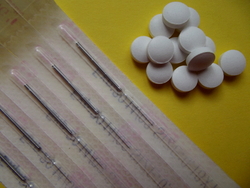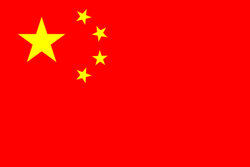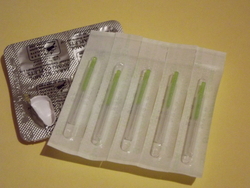 A review of 19 randomised controlled trials covering over 3600 patients, shows acupuncture is more effective for migraine prevention than propranolol. The meta-analysis by authors at Chengdu University of Traditional Chinese Medicine, looked at trials in which acupuncture or propranolol was compared to sham acupuncture, placebo, waiting list control, or usual care. The analysis showed acupuncture had a significant advantage over the drug in reducing migraine frequency over a four week period. Acupuncture was also associated with fewer adverse events.
A review of 19 randomised controlled trials covering over 3600 patients, shows acupuncture is more effective for migraine prevention than propranolol. The meta-analysis by authors at Chengdu University of Traditional Chinese Medicine, looked at trials in which acupuncture or propranolol was compared to sham acupuncture, placebo, waiting list control, or usual care. The analysis showed acupuncture had a significant advantage over the drug in reducing migraine frequency over a four week period. Acupuncture was also associated with fewer adverse events.
(Acupuncture versus propranolol in migraine prophylaxis: an indirect treatment comparison meta-analysis. Journal of Neurology, 21 August 2019.)

 A large Chinese systematic review concludes acupuncture helps migraine, with respect to both prevention and treatment. The meta-analysis included 62 trials covering over 4900 patients. Acupuncture was superior to sham acupuncture, standard medication and no treatment. It was also associated with lower pain scores than medication, up to three months after treatment. Acupuncture also enhanced quality of life compared with medication.
A large Chinese systematic review concludes acupuncture helps migraine, with respect to both prevention and treatment. The meta-analysis included 62 trials covering over 4900 patients. Acupuncture was superior to sham acupuncture, standard medication and no treatment. It was also associated with lower pain scores than medication, up to three months after treatment. Acupuncture also enhanced quality of life compared with medication. A team in Brazil studying acupuncture and headaches, has shown in a small trial that acupuncture can improve the effect of drug treatment. A total of 34 female patients aged 18 to 60, attending the Federal University of Maranhão’s hospital clinic, were randomised to receive either true acupuncture or sham acupuncture. The latter comprised non-insertive “needling”. Acupuncture was given twice a week for eight weeks. Both groups continued to take their prescribed pain medication.
A team in Brazil studying acupuncture and headaches, has shown in a small trial that acupuncture can improve the effect of drug treatment. A total of 34 female patients aged 18 to 60, attending the Federal University of Maranhão’s hospital clinic, were randomised to receive either true acupuncture or sham acupuncture. The latter comprised non-insertive “needling”. Acupuncture was given twice a week for eight weeks. Both groups continued to take their prescribed pain medication. Canadian researchers undertaking a randomised pilot study of acupuncture for menstrual migraine, have shown that acupuncture and acupressure could be safe options for its prevention. Eighteen women aged 22 to 52, were allocated to one of three groups: true acupuncture, acupressure and control acupuncture (using acupuncture points which the team did not anticipate would have any effect on migraine). The study lasted seven months, plus a three month follow-up. Treatment was given three times per month for three months.
Canadian researchers undertaking a randomised pilot study of acupuncture for menstrual migraine, have shown that acupuncture and acupressure could be safe options for its prevention. Eighteen women aged 22 to 52, were allocated to one of three groups: true acupuncture, acupressure and control acupuncture (using acupuncture points which the team did not anticipate would have any effect on migraine). The study lasted seven months, plus a three month follow-up. Treatment was given three times per month for three months. Acupuncture for chronic migraine is more effective and causes fewer side effects, than either botox or drugs, report Iranian researchers. A total of 150 patients (48 men & 102 women) were randomly allocated to receive a course of either acupuncture, botox injections or drug therapy (sodium valproate) for three months. Patients in the acupuncture group received 30 treatments in all.
Acupuncture for chronic migraine is more effective and causes fewer side effects, than either botox or drugs, report Iranian researchers. A total of 150 patients (48 men & 102 women) were randomly allocated to receive a course of either acupuncture, botox injections or drug therapy (sodium valproate) for three months. Patients in the acupuncture group received 30 treatments in all.